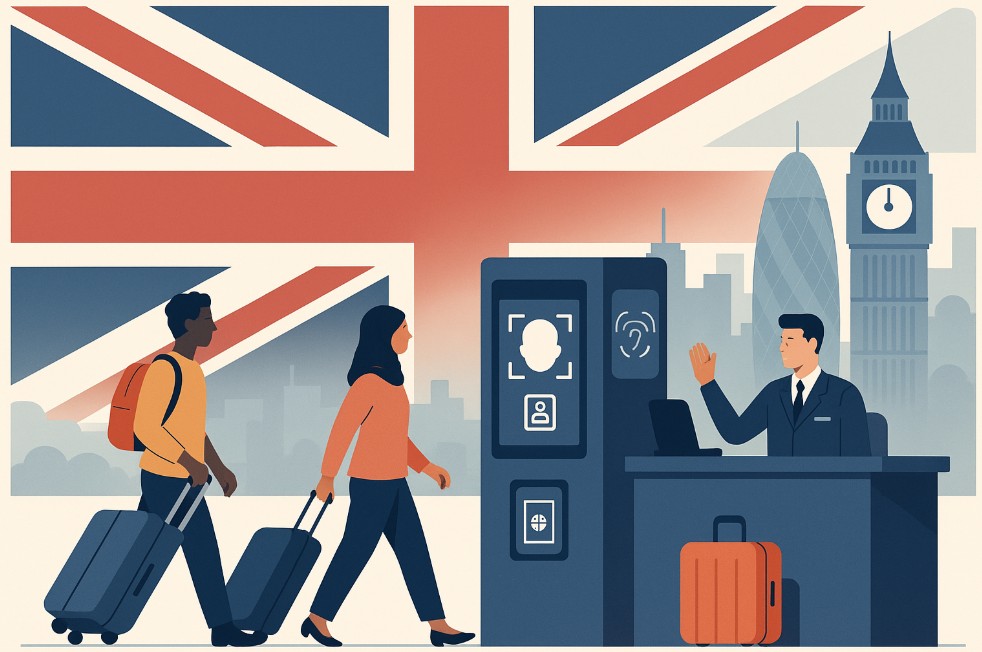New Immigration Rules UK July 2025: Full Breakdown of Skilled Worker Visa Changes
How Are the UK’s Immigration Rules Evolving, and What Do These Changes Mean for Employers, Visa Applicants, and the Broader Economy?
On 1 July 2025, the UK Government introduced one of the most substantial updates to the Immigration Rules in recent years. These reforms follow the publication of the May 2025 White Paper titled Restoring Control over the Immigration System and are officially implemented through the Statement of Changes in Immigration Rules (HC 997).
The changes are wide-ranging, with updates to the Skilled Worker visa, salary thresholds, family visas, care sector recruitment, settlement eligibility, and the closure of Afghan relocation routes.
The reforms are grounded in the need to control migration, reduce exploitation, enhance fairness, and ensure that immigration supports the UK’s economic and national security priorities. With the rules officially laid before Parliament and endorsed by the Home Office, these updates signal a major reset of the UK immigration system.
How Have the Skilled Worker Visa Requirements Changed?

The Skilled Worker visa route has seen the most significant restructuring. The Government has revised the eligibility criteria to ensure that only highly qualified individuals fill critical roles in the UK labour market.
Previously, occupations at RQF Level 3 (roughly equivalent to A-levels) and above were eligible under the Skilled Worker route.
However, from 22 July 2025, only occupations at RQF Level 6 and above (degree-level roles) qualify unless an exemption is made via inclusion in a government-sanctioned shortage list.
This shift is expected to reduce the number of eligible occupations by approximately 180. Applicants for Skilled Worker visas must now be sponsored for a job that meets both the required skill level and salary threshold.
Existing workers who are already in the Skilled Worker route, or have pending sponsorship at the time the rules take effect, will continue to be eligible even if their roles fall below the new skill threshold.
Additionally, these changes align with the Government’s broader ambition to reduce dependency on low-wage labour and focus on domestic recruitment and upskilling.
What Are the New Salary Thresholds for Work Visas?
The salary thresholds for work visas, particularly under the Skilled Worker route, have been increased in line with the Office for National Statistics’ Annual Survey of Hours and Earnings (ASHE) data for 2024.
The government had initially postponed these changes in April 2025 in anticipation of the White Paper, but the full adjustments are now being implemented.
The following table outlines the updated salary requirements:
| Visa Category | Previous Salary Threshold | New Salary Threshold |
| Skilled Worker Visa | £38,700 | £41,700 |
| Skilled Worker (PhD roles) | £34,830 | £37,500 |
There are no transitional arrangements for these updated salary thresholds. Employers and applicants must comply with the new rates immediately.
This is standard practice, as it is assumed that sponsored workers’ salaries will grow alongside wage trends in the wider UK labour market.
The Migration Advisory Committee (MAC) has been commissioned to review these salary benchmarks and consider any future transitional arrangements or exemptions.
What Is the Temporary Shortage List and How Does It Differ from the Immigration Salary List?
In response to feedback on sector shortages, the Government is transitioning from the older Immigration Salary List (ISL) to a new Temporary Shortage List (TSL).
The TSL is designed to provide time-limited access to the Skilled Worker route for sub-degree level occupations that are vital to the UK’s industrial strategy.
However, these occupations will no longer offer visa fee discounts, and workers in these roles will not be allowed to bring dependants to the UK. This marks a significant tightening of migration incentives for lower-paid roles.
Occupations on the TSL will be reviewed regularly by the MAC, and their inclusion is conditional on employers demonstrating efforts to recruit domestically and invest in training.
The TSL is set to replace the ISL by the end of 2026, with the exception of specific cases like adult social care, which will follow a separate timeline.
Why Is Overseas Recruitment for Care Workers Being Phased Out?

The care sector has faced intense scrutiny following widespread reports of exploitation, visa abuse, and non-compliance.
To address this, the Government is closing new overseas visa applications for care workers (occupation code 6135) and senior care workers (6136) from 22 July 2025.
However, a transition period until 22 July 2028 allows workers already in the UK to switch visa categories, provided they have worked legally for their sponsor for at least three months before their Certificate of Sponsorship was issued.
These rules ensure that workers and sponsors can demonstrate a legitimate employer-employee relationship, mitigating risks of abuse.
Dependants will not be permitted for workers in these roles going forward, with exemptions only for those already holding visas under the Skilled Worker route.
This policy aims to reduce strain on social services and prevent abuse of the immigration system.
What Are the New Rules for Family Visas and Settlement?
From July 2025, the minimum income requirement for sponsoring family visas has increased to £29,000, with a planned rise to £38,700 by early 2026. This affects British citizens and residents wishing to sponsor partners or children under the family visa route.
In addition, the Government is preparing to extend the qualifying period for settlement (Indefinite Leave to Remain) from five to ten years, with some exceptions.
This proposal is part of a broader plan to introduce an “earned settlement” system, where individuals accumulate points for economic and social contributions.
Exemptions will apply to:
- Partners of British citizens
- Victims of domestic abuse
- EU nationals with settled status
These changes will be subject to public consultation later in the year, and further details about qualifying criteria are expected.
Why Was the Afghan Relocations and Assistance Policy (ARAP) Closed?
As of 1 July 2025 at 15:00 BST, the ARAP scheme has officially closed to new principal applications. The Ministry of Defence concluded that the scheme had fulfilled its purpose, having relocated over 21,000 Afghan citizens and their families since 2021.
The decision to close ARAP without a 21-day notice period was taken to prevent a surge in last-minute applications, the majority of which were expected to be duplicates or ineligible.
This move allows the MOD to reallocate critical resources to national security priorities and process the remaining backlog efficiently.
Referrals made before the deadline will still be honoured. Similarly, the Afghan Citizens Resettlement Scheme (ACRS) is also closing to new referrals, though pending decisions under the Separated Families pathway will continue to be processed.
How Will the New Rules Affect Employers and Businesses?

UK employers must now navigate a more complex sponsorship system with enhanced compliance standards. The new rules introduce:
- Increased scrutiny of job authenticity
- Updated sponsor licence requirements
- Greater enforcement against misuse or abuse
Employers in sectors that previously relied on sub-degree roles, including hospitality and social care, will need to invest in domestic recruitment and upskilling initiatives or face labour shortages.
Startups and SMEs, in particular, may find the new salary thresholds challenging unless they use alternative routes like the Global Talent Visa or Scale-Up route.
What Legal and Legislative Framework Supports These Changes?
The reforms stem from the Government’s power under the Immigration Act 1971, implemented via a Statement of Changes laid before Parliament. These rules do not require primary legislation or parliamentary votes unless explicitly stated.
The changes align with existing legal standards, including the European Convention on Human Rights, and are subject to periodic review.
A statutory review clause ensures that the Home Office must assess the operation of these rules and report findings to Parliament every five years.
How Will the Government Monitor and Review These Immigration Rules?
The Home Office will publish updated guidance on GOV.UK as the changes take effect. These updates are only released once rules are live to avoid confusion.
The Government has committed to ongoing monitoring, including a detailed impact assessment (in development) and regular MAC reviews of salary levels, shortage lists, and migration trends.
These efforts aim to ensure the new rules remain responsive, balanced, and evidence-based.
FAQs About the New Immigration Rules UK July 2025
What skill level is required under the new Skilled Worker visa rules?
Only occupations at RQF Level 6 and above qualify unless the role is on the Temporary Shortage List or Immigration Salary List.
Are there exemptions to the increased salary thresholds?
No. All new applicants must meet the revised salary levels. Existing visa holders remain exempt from the skill level changes but not from salary thresholds.
Can care workers still apply for visas from overseas?
No. From 22 July 2025, overseas care worker applications are closed. Only in-country switches are allowed until July 2028.
What is the Temporary Shortage List?
The TSL provides temporary access to the Skilled Worker route for sub-degree occupations critical to the economy but removes dependant rights and discounts.
When will the new settlement rules apply?
The standard period will increase to ten years, but the Government will consult before implementation. Some categories will be exempt.
What happens to those already in the Skilled Worker route?
They can continue renewing their visas, change employment, and take supplementary work—even in roles below RQF Level 6.
Is there any way to challenge the new immigration rules?
Only Parliament can disapprove the changes within 40 days of being laid. However, most reforms under Immigration Rules do not require a vote.







